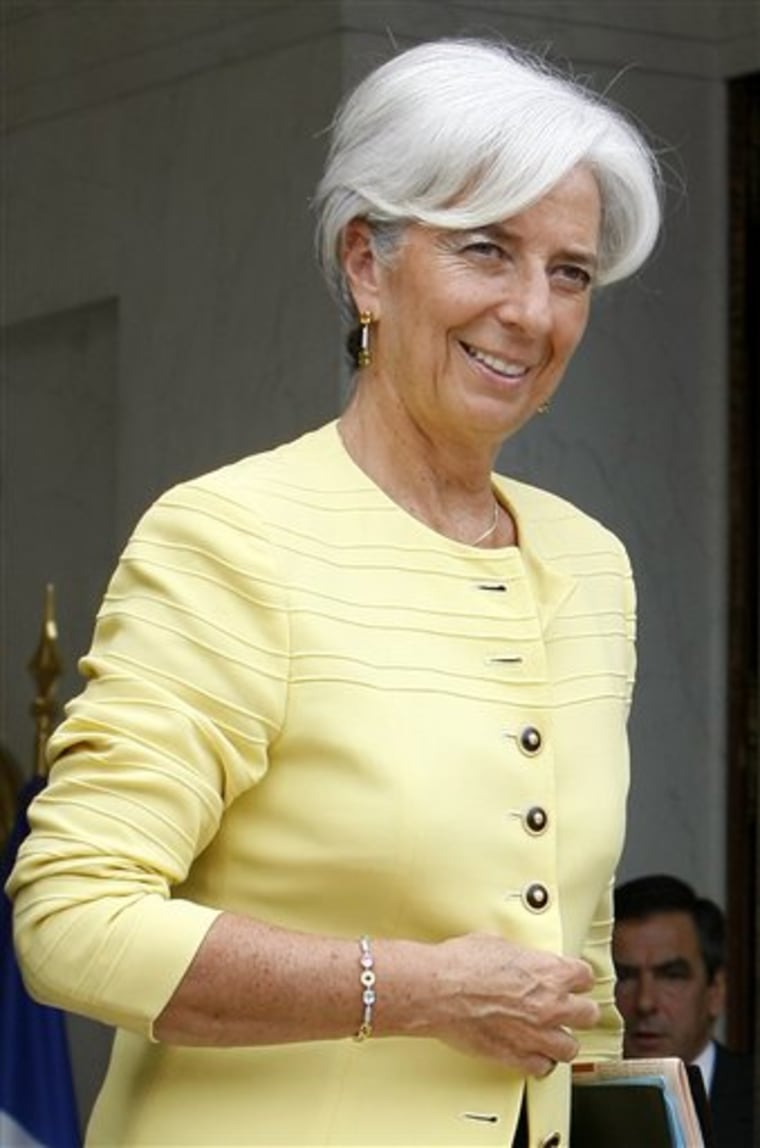Christine Lagarde's bid to head the International Monetary Fund could face new scrutiny now that Greece's worsening debt storm risks toppling one of her candidacy's key pillars — her track record shepherding the eurozone through the worst crisis of its 12-year existence.
With Greece coming close to a default, which would spark a chain reaction that some fear could break up the eurozone, the crisis management strategy of Lagarde and her European colleagues will come in for renewed criticism, analysts say.
Lagarde, France's finance minister, heads to Washington D.C. next week to try to drum up critical U.S. support for her bid. Her distant lead over the rival candidate, Mexican central banker Agustin Carstens, means a Greek default now is unlikely to derail her campaign.
But it will come back to haunt her — should she be chosen — because Europe's indecisive and disjointed handling of the crisis has caused the total size of the final bill to balloon, experts say.
Ever since Greece began its death spiral early last year, Lagarde has been one of the highest profile architects of the European response. She once threatened to pull the plug on Europe's financial lifeline to Greece if the country didn't honor its terms.
But a year on from its bailout, Lagarde and her European cohorts are again preparing yet another rescue package for Greece, despite its failure to meet promised deficit cuts.
"She'll argue that she's well placed, with political skills and managerial skills to broker compromises," said Simon Tilford, chief economist at the Center for European Reform, a London-based think tank. "But the problem is that in many people's eyes the eurozone leadership is discredited" by its failure to get a handle on its Greek problem once and for all.
"I think she'd make a brilliant president of the EU Commission, but I'm not entirely convinced she's the right person for this job," Tilford said.
Many investors and economists say Greece's debt problems will eventually end in default and that European leaders are guilty of misdiagnosing the crisis from the beginning.
One indication of that strategy's cost was given Thursday by a top official at the European Central Bank. Nout Wellink, a member of the ECB's rate-setting council, said European governments need to be ready to increase the size of their bailout fund to €1.5 trillion — double the size of the package that Lagarde and other officials said only months ago would be enough to stave off disaster.
"For the sake of argument, a year's delay has cost at least €750 billion," Neil MacKinnon, an analyst at VTB Capital in London. And that excludes indirect costs such as higher interest rates and bond yields, particularly in countries on Europe's troubled periphery such as Greece, Portugal and Ireland.
Europe's leaders have been "kicking the can down the road, and now we're running out of road," he added.
In launching her candidacy, Lagarde said she'd "bring all my expertise as a lawyer, a minister, a manager and a woman" to the job.
Her popularity is based in part on her reputation for deftness in international negotiations to stabilize the world economy during the world financial crisis. She also was seen as instrumental in getting the IMF and European Union to agree on rescue plans for Greece, Ireland and Portugal when their debt crises threatened the entire shared euro currency.
The 55-year-old headed the law firm Baker & McKenzie in Chicago before joining French politics in 2005. With excellent English, a direct manner and relatively pristine image, she is seen by many as a good candidate to quickly step into the job vacated by Dominique Strauss-Kahn and manage Europe's continuing debt difficulties as well as the myriad other challenges to the world economy.
Carstens, Lagarde's rival, has won the support of 12 Latin American countries, but not those with the most voting power — Argentina and Brazil.
The United States has continued to stay on the sidelines with the Obama administration not announcing its support for a candidate yet. Treasury Secretary Timothy Geithner met with Carstens on June 13 and is expected to confer with Lagarde when she is in Washington next week.
The top position became vacant after Dominique Strauss-Kahn resigned last month following his arrest on sexual assault charges, allegations that he denies.
The IMF's 24-member executive board is expected to interview both Lagarde and Carstens next week and aims to make a decision by June 30.
Lagarde was unavailable for an interview. Her spokesman Bruno Silvestre said that the potential worsening of the European financial crisis would have no bearing on Lagarde's candidacy. "She's ridden the wave, she knows how to handle a crisis," Silvestre said. Without Lagarde's input, the crisis "could have been a lot more severe for a lot more people," he added.
That argument holds little water with Tilford, however.
Europe's ineffective and divisive handling of the Greek debt crisis "has caused a lot of damage to political relations between member states," Tilford said. "That's going to make it difficult to bring about what's needed, which is closer political integration," Tilford said.
